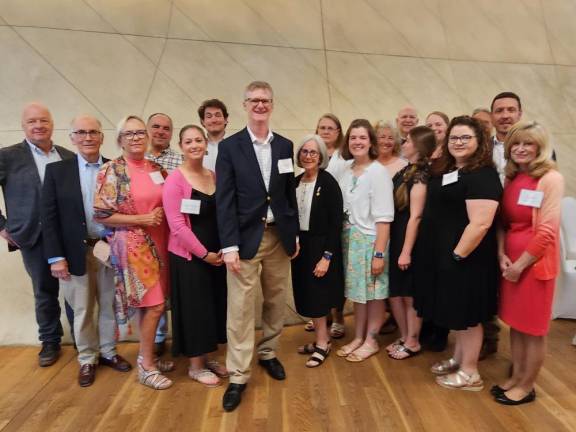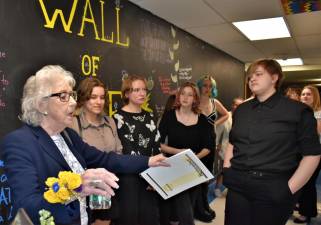Teachers learn more about the Holocaust
SUSSEX COUNTY. Kittatinny teacher attends Summer Institute in New Jersey, while Kean University staff member travels to Germany and Poland.

Two Sussex County residents who teach about the Holocaust spent part of their summers learning more about their subject.
Mary Houghtaling, an English teacher at Kittatinny Regional High School in Newton, attended the Jewish Foundation for the Righteous’s Summer Institute for Teachers in New Jersey.
She was one of 28 middle and high school teachers and Holocaust center staff from 13 states selected for the intensive five-day course in June.
Sarah Coykendall, managing assistant director of the Holocaust Resource Center at Kean University, attended the JFR’s 2023 European Study Program in Germany and Poland.
Although many miles and lifetimes apart, both credit the work of Elie Weisel, a Holocaust survivor and Nobel Peace Prize winner, with helping to inspire them to educate students about the genocide of 6 million European Jews during World War II.
Houghtaling’s high school students felt a connection to Weisel when they studied him in her class. They asked her to teach them more.
“Their desire to learn more made me want to do this,“ she said.
Coykendall, who lives in Montague, was a high school student when she first read Weisel’s award-winning novel, “Night.” She recalls being so moved by the book.
“I didn’t know how, but I knew I wanted to make sure this message of the Holocaust continued,” she said.
These moments ultimately led both of the women to apply to the JFR to continue their education. Both programs bring teachers to a deeper understanding of the Holocaust, with the hope that they will help educate future generations.
The Summer Institute, the first level of training, provides “teachers with a graduate-level course on the Holocaust; pedagogical connections with other teachers and their curriculum so they learn what has worked and what has not; and to give them additional resources for the classroom,” said Stanlee Stahl, JFR executive vice president.
The European Study Program takes this introduction and goes a step further.
“Visiting and studying at actual Holocaust sites helps teachers to better understand the enormity of the Holocaust and aids in making them more effective educators,” she said.
“We designed the program to help educators learn the Holocaust experientially so they can present it in a more meaningful and insightful way to their students and colleagues when they return to their schools.”
Houghtaling, a resident of Frankford, describes her experience as “overwhelming to say the least, in such a good way.”
She didn’t just learn information that she will bring back to her students. “I made amazing connections and we are sharing all kinds of information.”
Houghtaling has spearheaded the creation of the first high school Holocaust and Genocide Research Center in the United States at Kittatinny.
She also is teaching a class, “Holocaust and Genocide Studies,” which allows students to earn both high school and college credit through Stockton University.
Coykendall said being at historical sites where the Holocaust occurred had a tremendous impact on her understanding of the events. “To actually go to these sites in Europe, it transforms the way we look at history.”
She works with more than 40 high schools that offer dual credit from Kean University in Holocaust Studies. High Point Regional and Sparta high schools are among them.
Kean also will offer a tuition-waived class, “Teaching the Holocaust and Prejudice Reduction,” in Sparta for educators to learn more about the topic.
One of the JFR’s missions is to help teachers create opportunities for young people to learn about the Holocaust.
“As we continue to move further away from the Holocaust, it is more important to teach this period in history to the next generation,” said Stahl.
Houghtaling and Coykendall see Holocaust education as something that will always be relevant.
“It’s part of our humanity. We can use this to prevent other atrocities,” said Coykendall.
Visiting and studying at actual Holocaust sites helps teachers to better understand the enormity of the Holocaust and aids in making them more effective educators. We designed the program to help educators learn the Holocaust experientially so they can present it in a more meaningful and insightful way to their students and colleagues when they return to their schools.” - Stanlee Stahl, executive vice president, Jewish Foundation for the Righteous
